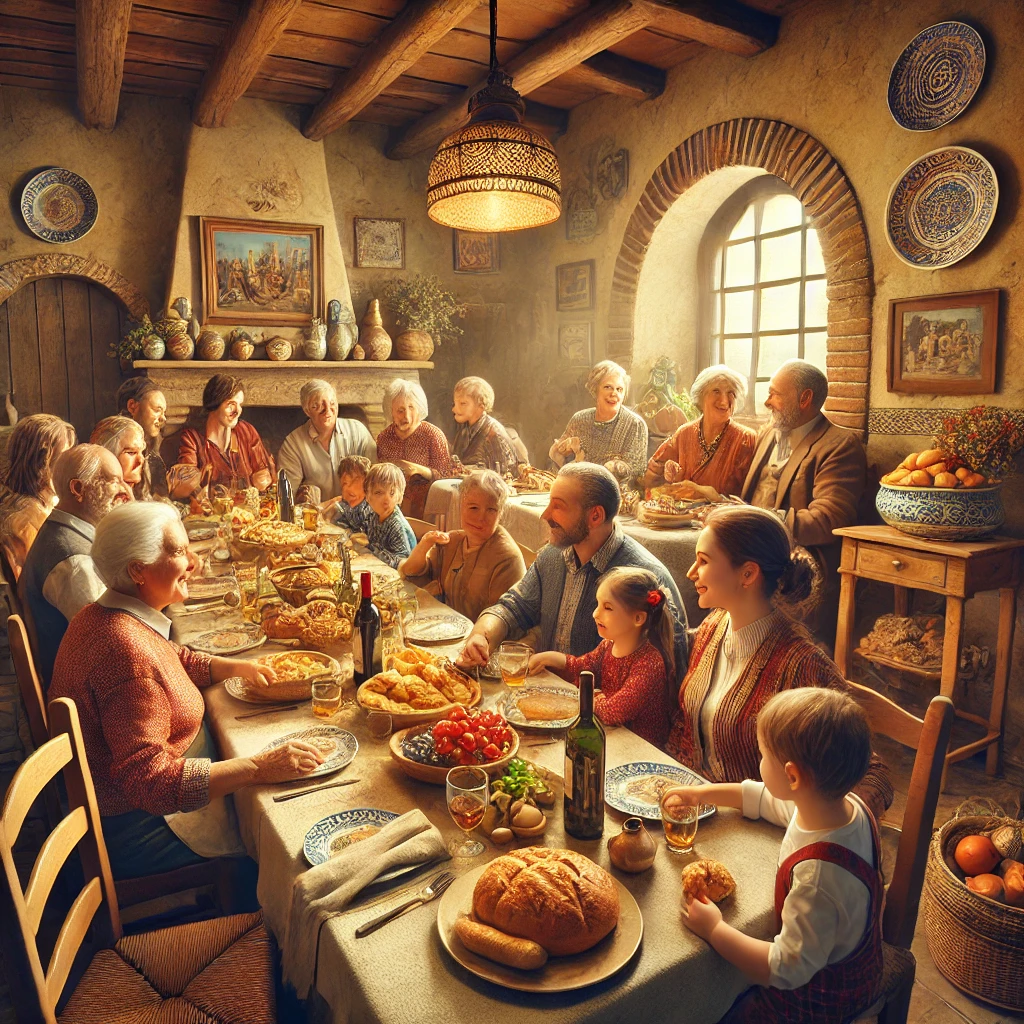Table of Contents
Introduction to Italian Family Values
Italian culture is deeply rooted in the intricate web of family values that shape its social dynamics and individual identities. The significance of family in Italian life cannot be overstated; it serves as the nucleus of social structure, influencing both daily interactions and long-term relationships. Family ties are paramount, often dictating social norms and expectations in various contexts, from community engagements to personal endeavors.
In Italy, the concept of family extends beyond the nuclear unit to encompass extended relatives, close friends, and even neighbors, reflecting a broader understanding of familial bonds. This ethos fosters a network of support systems that individuals rely upon throughout their lives. The emotional connections inherent in these relationships are often profound, providing an unwavering foundation during times of hardship or celebration. Family gatherings are a staple of Italian culture, serving as opportunities for members to reinforce their bonds, share traditions, and create lasting memories. Whether it is a Sunday meal, a holiday celebration, or a simple get-together, these moments underline the importance Italians place on familial unity.

Moreover, the influence of family on personal identity is significant. Italian individuals often derive a sense of belonging and purpose through their familial connections. The values instilled by the family unit—such as respect, loyalty, and love—shape personal behaviors and life choices. As a result, family in Italy is not simply an institution but a core aspect of one’s identity, providing emotional stability and a sense of community. Hence, understanding Italian culture necessitates a deep appreciation of the fundamental role that family plays in shaping social experiences and cultural practices.
Cultural Significance of Family in Italy
In Italy, family serves as the cornerstone of social structure, playing a crucial role in shaping individual identities and community dynamics. The deep-rooted traditions of family in Italian culture reflect a unique historical legacy characterized by strong interpersonal relationships and an emphasis on collective well-being. Italian families function not just as a unit, but as a vital support network that provides emotional, financial, and social assistance to its members.
The significance of family can be observed across various regions of Italy, with each area exhibiting its own nuances and traditions. In the south, for example, familial ties tend to be especially strong, often extending beyond the nuclear family to encompass a large network of relatives, including aunts, uncles, and grandparents. This interconnectedness fosters a sense of belonging that is ingrained in the cultural ethos. Conversely, in northern parts of Italy, while family remains a crucial element, the focus may shift slightly toward individualism, yet the core value of family support still holds strong.
The prominence of family-centric values in Italy is reflected in various aspects of life, from social gatherings to celebrations and rituals. Traditional meals, for instance, are often communal affairs where generational bonds are strengthened over shared dishes. Moreover, significant life events such as weddings, christenings, and anniversaries are celebrated with great enthusiasm, underscoring the importance of familial presence in shaping profound memories. Italian culture largely emphasizes the concept of ‘la famiglia,’ where loyalty, respect, and affection toward family members are paramount.
This powerful family-oriented perspective serves to instill values of compassion, unity, and resilience, which continue to influence Italian society today. Thus, it is evident that the cultural significance of family in Italy transcends mere kinship; it embodies an intricate tapestry of social fabric that upholds and nurtures individual and collective identity.
Traditional Family Roles and Dynamics
In Italian culture, family serves as the cornerstone of societal structure, where traditional roles and dynamics are deeply ingrained in everyday life. Each family member often assumes specific responsibilities that reflect the overarching values of respect, loyalty, and support. The expectations surrounding these roles are vital for maintaining harmony within the household.
Traditionally, parents hold significant authority within the family unit. The father often assumes the role of the primary breadwinner, responsible for financial stability, while the mother is typically the caretaker, nurturing and managing the household. This division of labor, however, has evolved in contemporary society, with many women actively participating in the workforce, yet the essence of maternal care remains a cherished value. Mothers are seen as the backbone of the family, ensuring that traditions are upheld and that children feel emotionally supported.
Children in Italian families are expected to exhibit respect and obedience towards their parents and elders. From an early age, they are taught the importance of family loyalty and maintaining strong bonds with relatives. Italian culture emphasizes the significance of sibling relationships; siblings often share a unique bond characterized by mutual support and camaraderie. This strong connection is reflected in various family gatherings, where siblings come together to celebrate and reinforce their ties.
The role of extended family is also noteworthy in Italian households. Grandparents frequently play a central role, offering wisdom and guidance while being actively involved in the upbringing of grandchildren. This close-knit network reinforces the cultural expectation of caring for one another, particularly in times of need. The interdependence among family members illustrates the importance placed on familial loyalty and care, ensuring that each member receives the necessary support throughout their lives.
Celebrating Family Through Italian Festivals
Italian culture is richly woven with family traditions that are prominently showcased during various festivals throughout the year. These celebrations, whether they are weddings, religious observances, or national holidays, serve as vital events that strengthen familial and communal bonds. One of the most significant aspects of these festivals is the emphasis on togetherness, reflecting the deep-rooted values associated with family life in Italy.
Weddings in Italy are a spectacular example of familial celebration. They often extend beyond the couple to involve entire families and communities. Traditional Italian weddings include elaborate rituals such as the “La Tarantella” dance, where family members unite in joyous celebration. The festivities can last for days, featuring traditional food and music that not only honor the union but also reinforce the importance of family support and kinship.
Religious festivals, such as Easter and Christmas, are also cornerstones of Italian family life. During Easter, families come together to partake in festive meals that often include specialties passed down through generations. The significance of these occasions is evident in the practices of attending church services as a family, embodying spiritual and familial connections. Similarly, Christmas celebrations often feature family gatherings, where traditions like the “Feast of the Seven Fishes” highlight the importance of heritage and shared experiences.
National holidays, such as Republic Day, offer another opportunity for families to unite in celebration. Parades, fireworks, and cultural activities encourage communal participation, fostering a spirit of togetherness that is deeply ingrained in Italian society. These festive occasions remind individuals of their familial roots and the cultural narrative that binds them as a community.
Through these diverse festivals, Italians express and celebrate the significance of family, making traditions not only a means of commemoration but also a vital element in preserving their cultural identity.
Italian Family Meals: A Culinary Tradition
In Italian culture, meals hold a central place not only as a means of nourishment but as a significant vehicle for family bonding and tradition. Shared meals are considered sacred moments where family members gather to engage in conversation, share stories, and reinforce their connections. Food preparation is often a communal activity, where generations come together to craft dishes that have been passed down through the ages, each recipe bearing the rich history and love of those who prepared it.
The importance of traditional family recipes cannot be overstated. These cherished culinary secrets create a sense of continuity and identity within Italian families. Activities such as making fresh pasta, baking bread, or preparing sauces become opportunities for teaching and storytelling, as older family members impart knowledge and experience to the younger generation. Each recipe has its own narrative, serving to bind the family together through shared history and collective memory.
Furthermore, the act of communal dining is integral to Italian family meals. The dining table transforms into a gathering place where everyone is welcome, and where the rhythm of life unfolds — from casual weeknight dinners to festive holiday feasts. During these meals, the rich flavors of Italian cuisine are further enriched by laughter, lively discussions, and a sense of belonging. Such occasions reinforce familial ties, highlighting the value placed on togetherness and shared experiences.
Italian family meals epitomize the heart of Italian culture, where food becomes a symbol of love, unity, and a shared heritage. As families come together around the table, they not only enjoy culinary delights but also nurture relationships that contribute to the fabric of their lives. This longstanding tradition of family meals not only celebrates the palate but also strengthens the bonds that define what it means to be part of an Italian family.
The Role of Grandparents in Italian Families
Grandparents occupy a cherished position within the framework of Italian families, serving not only as caregivers but also as pivotal custodians of cultural heritage. Their presence bridges the generational gap, offering continuity and stability that is integral to Italian familial structures. In many Italian households, it is commonplace for grandparents to live with their families or to maintain close proximity, thereby fostering an environment of mutual support and shared responsibility. This close-knit arrangement allows grandparents to pass down invaluable life lessons, cultural practices, and family traditions to younger generations.
The bond between grandparents and grandchildren extends beyond mere caregiving; it encapsulates a deep emotional connection that influences family values significantly. Italian grandparents often engage their grandchildren in storytelling, recounting tales from their own childhoods and imparting moral lessons that reflect traditional Italian values. Through these narratives, children acquire a sense of identity, appreciating their lineage and cultural background. The rich tapestry of family history shared in these stories plays a crucial role in shaping a child’s understanding of their place within the larger family unit and society.
Furthermore, grandparents in Italian families frequently take on active roles in nurturing familial bonds during gatherings and rituals. They are often the first to teach grandchildren essential culinary skills, by involving them in time-honored recipes that have been passed down through generations. This not only strengthens family ties but also ensures that these culinary traditions remain alive, enriching the family’s cultural tapestry. Overall, the role of grandparents transcends caregiving, illuminating the importance of intergenerational connections that sustain and perpetuate the family’s cultural heritage.
Challenges to Traditional Family Structures
In contemporary Italy, traditional family structures are facing numerous challenges influenced by globalization and societal transformations. Historically, Italian families have been characterized by strong kinship ties and collective values, with extended families often living under one roof. However, recent trends indicate a shift towards nuclear family arrangements, wherein parents and children form an independent household. This change reflects broader societal shifts, where individualism and self-sufficiency are increasingly prioritized over communal living.
One significant factor contributing to this shift is migration. As young Italians seek opportunities abroad or in larger cities, they often leave behind their familial support systems. This migration leads not only to the physical dispersal of families but also alters the dynamics of familial relationships. Consequently, many families are experiencing reduced interaction and a redefinition of their roles. The traditional helix of familial responsibilities that guided relationships is being replaced with a more modern approach, often characterized by independence and less obligation to extended family members.
Moreover, changing gender roles in Italian society have also impacted family structures. With more women entering the workforce and pursuing careers, the roles within households are evolving. The traditional model where the father is the primary breadwinner and the mother the caregiver is giving way to shared responsibilities. Such changes foster a partnership model in families but may simultaneously weaken the concept of collective family duties that once defined Italian culture.
As a result, while these transformations can promote equality and empower individuals within family units, they pose potential implications for the values that have traditionally been upheld in Italian culture. The shift towards nuclear families and changing roles may challenge long-standing traditions and reshape the essence of the Italian familial experience.
Post-Pandemic Family Dynamics in Italy
The COVID-19 pandemic has profoundly influenced family structures and traditions worldwide, and Italy is no exception. Traditionally, Italian families have placed a significant emphasis on close-knit relationships, often exemplified by intergenerational living arrangements. However, the pandemic necessitated changes in these dynamics, leading to both challenges and adaptations in the way families interact and support one another.
During the height of the pandemic, many Italian families experienced a shift in living arrangements as younger generations returned to their parental homes. This trend not only facilitated support in times of uncertainty but also reinforced the value of familial connections. Family members became caregivers, cohabitants, and companions, allowing for deeper intergenerational bonds to form. The pandemic served to remind many Italians of the importance of being surrounded by loved ones, particularly during challenging times.
Moreover, the traditional family gatherings that are a hallmark of Italian culture faced significant constraints due to lockdown measures and health concerns. Large family meals and festive celebrations were replaced with virtual gatherings, and in many cases, interactions became limited to smaller, more intimate settings. This shift highlighted a newfound appreciation for the time spent together, as families learned to adapt their traditions to accommodate safety protocols. As a result, the focus shifted from quantity to quality, further emphasizing the emotional support derived from familial relationships.
The resilience of Italian family values emerged as a pivotal aspect during the pandemic. Many families took the opportunity to reconnect, fostering not only emotional strength but also a sense of collective purpose. This evolving dynamic has created a stronger foundation for future family interactions, as individuals recognize the significance of their connections. The pandemic acted as a catalyst, prompting Italians to cherish their familial bonds, ensuring that family remains at the core of their culture even in the face of adversity.
Conclusion: The Everlasting Importance of Family
In reflecting upon the intricate role that family plays within Italian culture, it is clear that family traditions serve as a beacon of unity and continuity. Despite the multitude of modern challenges that threaten traditional values, the significance of family remains steadfast. Central to this cultural framework is the notion of familial bonds, which go beyond mere social connection. They form the backbone of societal norms and personal identities in Italy.
The blog has demonstrated how family gatherings, shared meals, and collective celebrations are not just cherished customs; they are integral to maintaining relationships and establishing a supportive network. Such rituals foster resilience and cohesion, allowing individuals to navigate life’s complexities while remaining anchored in their heritage. Moreover, the influence of family can often be seen in the way Italians approach their work and community interactions, emphasizing loyalty, respect, and collective well-being.
Italian family values have evolved through generations, yet their core essence remains intact. Esteemed qualities such as love, respect, and commitment are paramount and continue to be passed down through the years. This enduring legacy is not only crucial for personal growth but also plays a pivotal role in reinforcing social fabric.

In closing, no discussion on Italian culture can be deemed complete without acknowledging the enduring importance of family. The lessons gleaned from family traditions foster a sense of belonging and continuity that resonates deeply within the Italian identity. As Italy navigates modernity, it is this profound connection to family that will persist, guiding future generations in their pursuit of both individual and collective fulfillment.






The clarity and simplicity of your writing are a perfect complement to the depth of the ideas you explore.